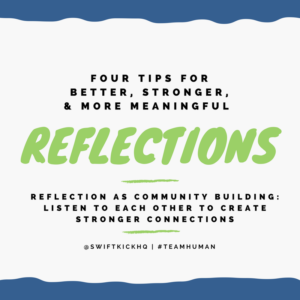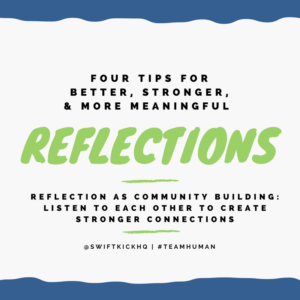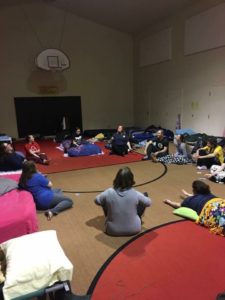A while back, I realized something was missing from my college experience: volunteering. I had volunteered throughout high school at a local animal shelter and YWCA, but when I entered college, all my time seemed to go to work, school, and other involvement. After some reflection, I realized that I seriously missed giving my time freely to important causes.
I decided to apply to go to one of my university’s Alternative Spring Break trips as a way to get myself back in the swing of volunteering. Getting my acceptance email involved a lot of jumping up and down and screaming in the aisles of a Target. It was not my finest moment, but it was definitely one of my happiest. I was finally committed to volunteering again!
I used my Spring Break to participate in a week-long service project in Pulaski, Virginia with 10 other students and 2 advisors. I’ve never been a part of a better team than when I was on Alternative Break. I went into this experience knowing I’d have an incredible time, but I could have never imagined just how good it ended up being. I’m certain this will be the first of many blog posts about my time spent in rural Virginia.
One of the most important aspects of our team building was the time we gave each other for reflection. Our co-leaders gave us journals to gather our thoughts throughout the week and occasionally provided us with guided writing questions. These journals were super helpful, but I think the really powerful realizations came after the writing. Almost every night, we grouped together in a circle and talked about our highs and lows of the day with each other. Seems simple, right? It ended up being so much more than highs and lows.
Lots of people in our team spoke about our reflection times as some of their favorite parts of the week. Our time spent in circles listening to each other, empowering each other, and giving each other feedback was where we truly bonded. Once we began sharing, we obtained a contagious energy. There was rarely a night where we talked for less than an hour and a half. We laughed, we cried, and we built a strong community.
I have definitely been part of teams that ask for reflection and are met with blank stares and silence. This was not the case with our incredible group. I’m listing some of our special qualities below in order to help others build community through reflecting on their experiences together.

Respect that reflection is an individual process
Choosing how to reflect is up to each person individually. On our trip, some people wrote down their highs and lows to remember, and some people winged it. Similarly, some of us could go on for hours about what went well or what went wrong, whereas some of us were more succinct. Remember that there is no one way to reflect. If someone is quieter than someone else, it doesn’t mean they’re bored. They could just express themselves differently, and different is okay!
Something else to keep in mind during reflection is that someone’s high might be your low. Keep in mind that everyone on your team has a separate life, and people might react dissimilarly to the same experiences. Respect individuals by allowing them to come to their own conclusions. Reflections don’t necessitate a group consensus about whether or not something that happened that day was positive.
A final thought on individuality during reflection is that while someone is speaking, everyone else should be listening. Our group was stellar at holding back comments until the end of someone’s turn, raising our hands if we had something to add, and acknowledging that everyone deserved their time to speak. When a reflection turned into a conversation, we always brought it back to the person who was originally speaking to see if they had anything else to add. Make sure everyone is heard in your group to ensure true community building.
Get specific. Name names
Have a shout out for somebody? Say their name! There is magic in addressing someone in particular, especially in group settings. Nothing makes people feel more important than naming their contributions to something positive. I couldn’t count on both hands the amount of times people in our group had someone they wanted to praise. Whether it was for doing something selfless or cracking a hilarious joke, our team was all about getting specific and naming names.
On the other hand, it is also important to name feelings. Sweeping generalizations about emotions throughout a day don’t do much to help anyone grow from their experiences. Rather than saying something felt bad or I-don’t-know, name specific feelings. Maybe someone’s words hurt you earlier, and you want to ensure that you don’t continue feeling hurt. Maybe you’ve felt silenced or ignored when you have ideas to share. Whatever it is, get specific about your experiences and name your emotions. Nothing will change if you keep everything inside.
Have tissues ready
I find that the best groups I’m a part of are also unanimously the most emotional. When everyone is engaged in a conversation about experiences and feelings, people can get worked up. Allow this to happen. Be prepared for this to happen. Encourage your team to share even their messiest feelings, and foster an environment that supports all team members. Having tissues ready is such a small action, but it can mean the world to someone who is being vulnerable. A tissue can say a thousand words, like “you’re okay” and “we understand.”
I found this part of reflection to be particularly important with my group. There are unique challenges presented to the idealists, the action-takers, and the open-hearted people that made up our squad. Because we were working on a service project, emotions were already high. We were a team focused on making a difference. At the end of each day, whether or not our expectations were met, we were occasionally teary. There was no judgment to be found among us, though. Pass the tissues, friends. We all need them sometimes.
End on a high note (if you can)
Sometimes it’s too exciting to try to keep good news for the end of a turn around a circle. I had plenty of moments on this trip where I spit all my highs out as quickly as I could when it was my time to speak. However, ending on lows can bring a mood down quickly. If you have highs for the day, try saving them for the end of your turn. This will help keep everyone’s spirits up for the rest of the reflection time.
Additionally, challenge yourself to put a positive spin on your lows. This can be extremely difficult, especially at the moment, but it’s an exercise worth the effort. Take time to think about what you learned from your negative experiences that day. How can you apply your new knowledge in the future? Doing this also helps your transition from lows to highs go even smoother.
My Alternative Break experience was incredible, but it would not have been nearly as amazing if it wasn’t for my astounding team. One action we did extremely well was reflecting. Our reflections brought us closer together and gave us opportunities to get to know and bond with each other. These are the tips I’ve gathered from reflecting with my group. When have you had great reflections, and what tips would you add to this list?





